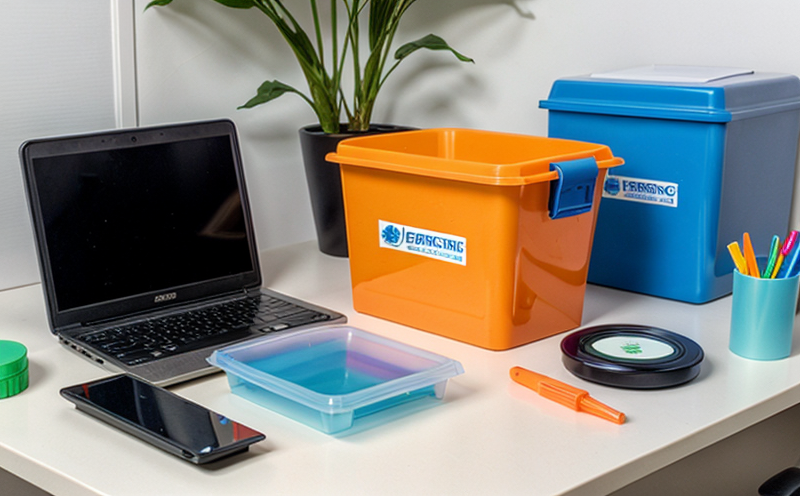IEC 60721 Climatic Condition Resistance Testing of Office Plastics
The IEC (International Electrotechnical Commission) Standard 60721 provides a framework for assessing the resistance of plastics to climatic conditions, specifically in office environments. This test is crucial for ensuring that materials used in office and stationery products can withstand varying environmental factors such as temperature, humidity, ultraviolet light, and chemical exposure without degrading performance or safety.
The standard defines several different climatic conditions under which the materials are subjected to testing. These include high temperatures, low temperatures, high humidity levels, and ultraviolet radiation. The purpose of these tests is not only to ensure product reliability but also to enhance user safety by preventing potential hazards arising from material failure or degradation.
For office stationery plastics, compliance with IEC 60721 ensures that the products meet international quality standards, which can be a significant factor in gaining market access and consumer trust. Compliance also helps manufacturers demonstrate their commitment to environmental responsibility and safety by ensuring materials used do not pose risks to health or the environment.
The testing process involves carefully preparing specimens according to specified dimensions and tolerances defined within IEC 60721. Specimens are then exposed to controlled climatic conditions designed to replicate real-world office environments. The duration of exposure varies depending on the specific requirements set out in the standard, but it can range from hours to weeks.
During testing, continuous monitoring ensures that any changes or degradation in material properties are captured accurately. This data is then analyzed against predetermined acceptance criteria outlined within IEC 60721 to determine whether the materials meet the necessary performance standards.
In summary, compliance with IEC 60721 for office plastics testing guarantees robustness and longevity of products used in offices, enhancing both safety and user satisfaction. It plays a vital role in maintaining high-quality standards across various industries that rely heavily on reliable plastic components.
Applied Standards
The IEC 60721 series of standards includes multiple parts, each addressing different aspects related to climatic condition resistance testing. Specifically for office plastics, IEC 60721-2-53 is applicable:
- IEC 60721-2-53: This part covers the specific requirements and procedures for conducting climatic condition resistance tests on office plastics. It specifies conditions such as temperature ranges, humidity levels, exposure durations, and methods of measurement.
The standard emphasizes that these tests are designed to simulate the actual operating environment where the product is expected to be used. This ensures that any potential issues arising from material degradation or failure can be identified early in the development process, allowing manufacturers to make necessary adjustments before products reach the market.
Compliance with IEC 60721-2-53 demonstrates a commitment to quality and safety standards recognized globally by industry professionals. By adhering to these international guidelines, companies can ensure that their office plastics meet stringent requirements set forth by regulatory bodies worldwide.
Industry Applications
| Application | Description |
|---|---|
| Office Furniture | Covering items like chairs, desks, and filing cabinets, this application ensures that plastic components remain durable under typical office conditions. |
| Stationery Products | Including pens, notebooks, file folders, and other writing tools, these products require materials that can withstand frequent handling and occasional exposure to moisture or chemicals. |
| Data Storage Devices | Such as USB drives and compact flash cards need to be resistant to temperature fluctuations and humidity to ensure data integrity over time. |
| Electronic Accessories | Items like mouse pads, keyboard covers, and other accessories for computers must maintain their functionality despite exposure to various environmental factors. |
| Adhesives and Sealants | Materials used in bonding different parts of office equipment need to be stable against temperature changes without losing strength or adhesion properties. |
| Plastic Coatings | These are often found on various office products, providing protection from wear and tear as well as aesthetic appeal. |
The above table highlights some key areas where IEC 60721-2-53 plays a critical role. By ensuring that plastics used in these applications meet the specified standards, manufacturers can enhance product longevity, improve user experience, and boost overall brand reputation.
Eurolab Advantages
At Eurolab, we pride ourselves on offering comprehensive services that cater to the unique needs of our clients in the polymer & plastics testing sector. Our expertise lies in providing accurate, reliable, and timely results for IEC 60721-2-53 compliance.
State-of-the-art Facilities: Eurolab is equipped with advanced laboratories that house cutting-edge equipment capable of replicating real-world environmental conditions. This allows us to conduct precise tests according to the latest standards and guidelines.
Experienced Professionals: Our team consists of highly skilled technicians and engineers who are well-versed in IEC 60721-2-53 requirements. They bring extensive experience from similar projects, ensuring consistency and accuracy throughout every step of the testing process.
Certified Compliance: Eurolab adheres strictly to international standards including ISO/IEC 17025:2017, guaranteeing that all our tests are conducted in accordance with best practices. This ensures confidence in the results provided by our team.
Moreover, we offer flexible scheduling options tailored specifically for your schedule while maintaining high-quality standards consistently. Our commitment to excellence extends beyond mere compliance; it includes proactive support throughout the entire testing lifecycle from initial consultation through final report delivery.





